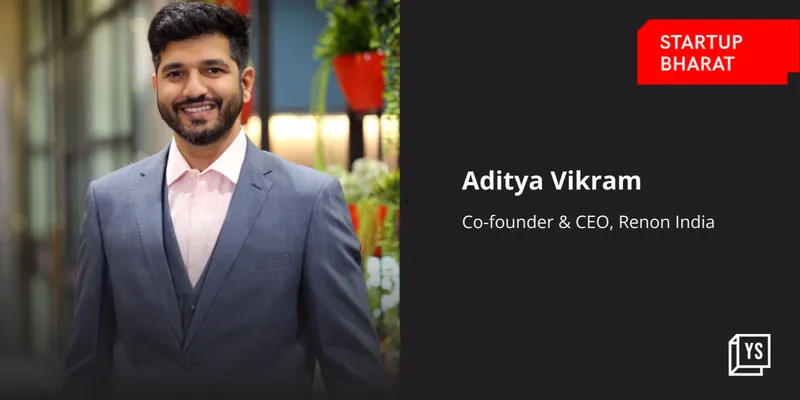Surat-based Renon India wants to power an all-electric future
B2B startup Renon India produces 300 battery packs per day, each with 0.5 kWh capacity at its Surat manufacturing facility.
Aditya Vikram and Vineet Mittal wanted to use renewable and sustainable energy to generate an 'infinite' supply of energy that could pave the way for an all-electric future.
In 2019, the duo established Renon India, a Surat-based lithium-ion (Li-ion) battery manufacturing company.
In a conversation with YourStory, Aditya, Co-founder and CEO of , says, “While establishing the company, the biggest challenge was to enter the industry, which was still in its infancy in India.”
“Fortunately, the awareness around the benefits and potential of clean energy, especially the rise of electric vehicles (EV) demand in India, led to increased demand and a larger market for Li-ion batteries,” he adds.
According to Maximize Market Research, the Indian Li-ion battery market was valued at $1.91 billion in 2021, estimated to reach $5.2 billion by 2029. On the other hand, the global Li-ion battery market size is estimated to grow at a CAGR of 15.3% over the stipulated period.

An original equipment manufacturer (OEM), Renon operates a business-to-business (B2B) model, which revolves around Li-ion battery packs and energy storage systems (home UPS).
It has products for various applications, including solar home lighting systems (SHL), solar water pumps, wheelchairs, EV two-wheelers and three-wheelers, solar street lighting systems (SSL), and UPS/BESS, to name a few.
Bootstrapped with Rs 15 crore, the startup operates on a hybrid model of horizontal and vertical mixed units.
Aditya explains, “As individual verticals, we have functions like electronics, mechanical, software, quality, and manufacturing, where some employees also work in tandem with specific horizontals like application and development engineering.”
The B2B startup builds its mobility packs to perform on Indian roads, comprising a variety of riding and climatic conditions. The company makes its battery packs as per customers' tailored requirements.
“The Renon battery management system is at the heart of its battery packs, ensuring their safety, reliability, efficiency, and performance. Its battery management system (BMS) guarantees the packs run at the desired charge, power, health, and energy levels,” Aditya says.
Its Li-ion energy storage solutions have a range of applications—from home to commercial to industrial, catering to automobiles, defence, solar, telecommunications, and healthcare sectors.
At its Surat facility, with a manufacturing capacity of 50MWh, the startup produces 300 battery packs per day, each with 0.5 kWh capacity. By FY23, it plans to expand its facility to make 600 battery packs per day, and by 2024, it plans to increase its manufacturing capabilities to 300MWh.
At present, Renon India’s focus areas include swappable battery pack research and in-house BMS development.
With over 50 employees and a team of more than 30 cross-functional engineers, the co-founder says, “This number is rapidly increasing with the steady growth of the company.”
Besides Aditya, the company has Ganesh Moorthi as the CTO and Vineet Mittal as a director in the company. The company’s core team comprises Ankit Singhania, Sunay Shah, Aditya Singhania, and Saurabh Aggarwal.
In 2021, Renon India established a dedicated research and development centre in Bengaluru. The company intends to achieve the milestone of over 300 MWh of production line capacity soon, capable of manufacturing nearly 3,000 battery packs per month.
The present and future
Renon India’s competitors include OEMs such as Nexcharge, Sun Mobility, Exicom, Inverted, Battrix, Grinntech, etc.
At present, the startup operates from Gujarat, Delhi-NCR, Hyderabad, and Bengaluru.
Depending on future demand and market scenario, the firm is open to starting its manufacturing facilities outside Gujarat.
Speaking of future plans, Aditya says, “We look forward to expanding our sales and service team in various parts of India by July 2023. We have diligent plans to expand our service team into 10 different zones (geographically and strategically) across the nation.”
With Renon’s products and services available pan-India, Aditya adds, “Our primary target markets include B2B OEMs in electric vehicles and OEMs in UPS devices.”
Some of its major clients include Ati Motors, Pi Beam, Aventose, Warivo Motors, Seven Greens, Nessa Illumination, Pride Led, Rayfuel Enercon, etc.
In FY23, the startup is expecting sales of Rs 40 crore ($5.02 million) compared to Rs 25 crore in FY22.
“We are driving this growth with our cutting-edge battery manufacturing systems and pack-building capabilities. We are geared up to set a new standard in the energy storage industry,” Aditya says.
Renon is expecting a growth of 50% CAGR in the next three years. Moreover, it also has plans to raise $2 million in funding, which it will use for R&D, capex expansion, tech stack development, etc.
Edited by Suman Singh








